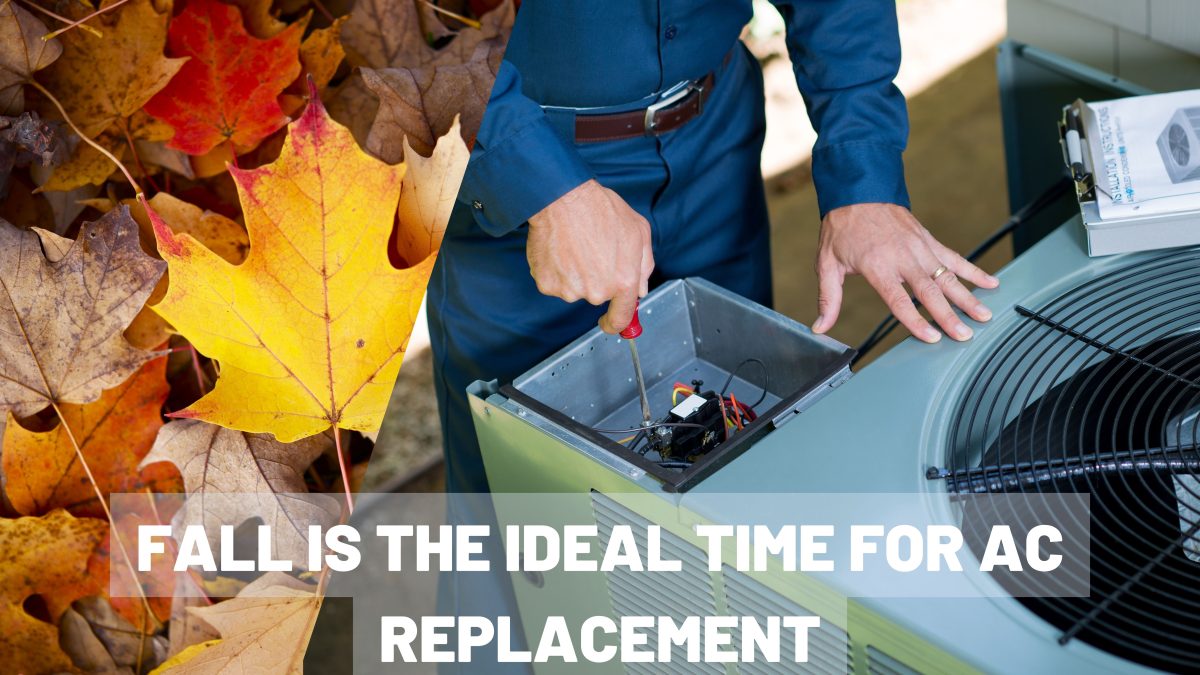Fall Season Is The Best Time To Replace Your AC System, Here’s Why
The last thing you want on a hot summer day is for your air conditioner to stop blowing chilled air. You always seem to find your system is spewing out air but not cooling to the desired temperature during the hottest weeks of the summer. How is your air conditioner doing, and what can you do to resolve the issue?
The problem might originate from any one of the several components that make up an air conditioning system since they all function as a unit. An indoor and an outdoor unit, an evaporator coil, an air filter, a thermostat, copper tubing, etc. are examples of system components. Homeowners may sometimes diagnose and resolve issues on their own, but other times they need to call HVAC assistance to schedule a visit from a specialist.
There are a number of potential causes for your air conditioner to not be generating cold air, but there are also measures you can take to fix the problem.
FYI while it’s always best to keep up with the routine maintenance in order to avoid system failure, when the system’s life Time close to end it’s better to replace it rather than keep spending on frequent temporary fixes. And there’s no better time for an AC replacement project than the fall!
During the fall season most Hvac companies have more availability to take on a system replacement project, than during the summer. The temperature is cooler and more comfortable HVAC technicians to work on system installations.
You do not want to wait till the winter to replace your Hvac system, simply because that’s a time where you need it most to heat up your home, as the installation time may sometimes be lengthy.
Reasons For Your AC Not Cooling:
Temperature check:
The thermostat may be adjusted improperly, which is one of the easiest causes of AC that runs but doesn’t cool off your house. Make sure the thermostat is set to cool. If the switch is currently set to “on” or “fan,” try switching it to “automatic” and see if anything changes. The fan operates continually when the thermostat is set to “on,” even if the air is not being cooled. Sometimes all you require is a setting adjustment.
Filter Issues:
Next, you should inspect the system’s air filter if your thermostat is correctly configured, and the problem still persists. Its purpose is to collect airborne dust and grime, however with time it gets dirty. A blocked filter prevents airflow, which lowers your home’s cooling capacity.
Take the air filter off and look it over. Replace the filter and check to see whether the issue is resolved if it has been at least two months since it was changed out or if it is too dirty to see through.
Condenser unit is dirty:
Heat from the inside of your house is collected by the condenser, which is placed outside. The condenser coil cannot discharge the heat that has accumulated in its system if it is clogged with dirt, grass, or other debris. This may result in AC issues and occasionally even a system shutdown.
Remove the dirt and debris from the coil with care, then gently rinse it with a hose to clean it. Avoid applying excessive pressure to avoid bending any of the coil’s “fins.”
Jammed Evaporator Coil:
The interior portion of your air conditioning system houses the evaporator coil. Warm air enters the evaporator coil where it is converted into cold air by removing heat and humidity from the inside. If you see excessive condensation close to the interior unit, limited ventilation, or frost buildup on refrigerant tubing, the evaporator coil may be frozen.
Leaking of Refrigerant:
Central AC needs refrigerant to cool things down. It moves between the evaporator and condenser coils, absorbing heat energy from within and releasing it outdoors. Lack of cold air blowing and heat absorption are two effects of refrigerant leaks. A refrigerant leak is frequently indicated by the accumulation of ice on your outside unit or the sensation of warm air coming from your ventilation system.
Faulty Heat Pump:
As the outside unit, a heat pump may be used in some AC systems. It performs similarly to a typical AC unit and can be susceptible to similar issues. If the heat pump isn’t cooling the inside, check the thermostat settings, the air filters, and any indications of blocked coils.
Some of these difficulties may be resolved on your own with routine maintenance and cleaning, but for other more serious concerns, you’ll need to call an HVAC specialist. When in doubt, call in an HVAC expert to inspect your system so you don’t run the danger of doing further harm. You can make sure that your system continues to function flawlessly by maintaining it and doing routine inspections.
So this fall you should probably consider replacing your Hvac system if it’s been giving you trouble, and prepare your home to be warm and cozy as the winter is getting closer. Give us a call today and let’s discuss your options for a new AC system.




